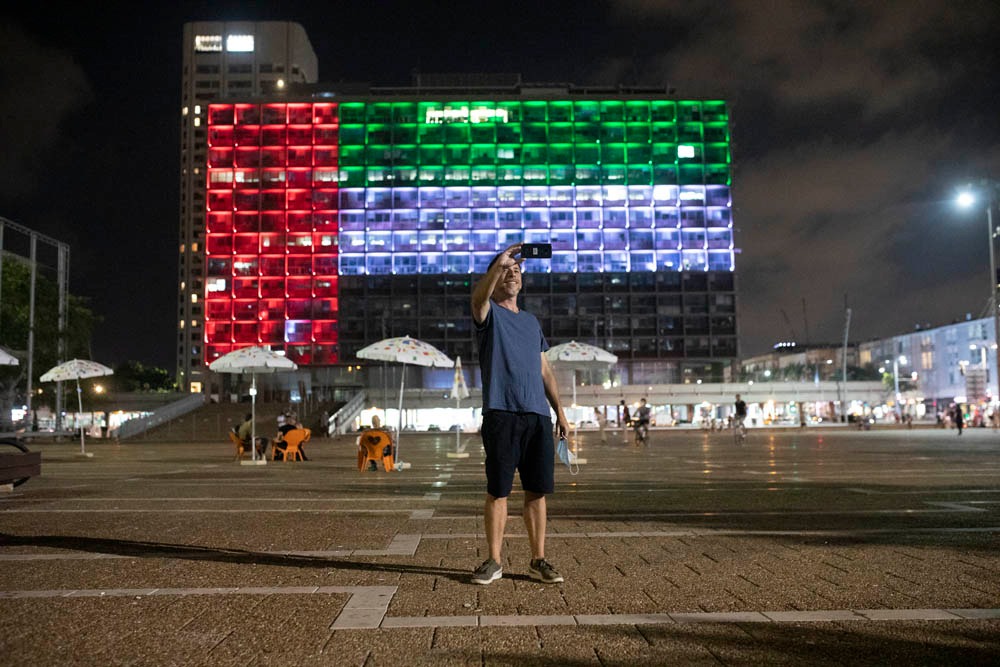On August 13, Israel and the United Arab Emirates signed a historic deal to normalize relations between the two countries. Under the agreement, which was brokered by U.S. President Donald Trump, Israel will suspend its annexation of parts of the West Bank. On Twitter, Trump called the agreement a “HUGE breakthrough,” and a “historic peace agreement between our two GREAT friends.”
The peace deal is the culmination of years of warming ties between Israel and the Gulf (or Khaleej in Arabic) countries, buttressed by a demonstrable shift in Arab public opinion. While the deal immediately came under attack for disregarding Palestinians’ aspirations for self-determination, it was also welcomed enthusiastically by many social media influencers from around the GCC.
Over the past decade, as the rise of Iran’s regional influence has been countered by the growing power of the Gulf states, Israel has been using a web of Arabic-speaking social media accounts to spread pro-Israel propaganda in order to win over the hearts and minds of Khaleejis and neutralize the perceived threat of the Islamic Republic. Now, with a peace deal on the horizon, it seems those efforts have borne fruit.
The Israeli-Palestinian conflict has historically played a significant role in Israel’s relations with the Khaleej. Initiated in the 1990s following the Oslo Accords, annulled in the early 2000s during the Second Intifada (partly as a result of mass popular protests in some Khaleeji countries), recalled in the 2002 Arab Peace Initiative, and covertly re-established throughout the 2000s and 2010s, Netanyahu’s government has recently been successful in warming ties with the nations of the Gulf Cooperation Council — specifically the UAE, Saudi Arabia, Bahrain, and to a lesser extent, Oman and Qatar.
Already in the late 2000s, the Israeli government began utilizing social media to spread hasbara, its national propaganda efforts. Since 2008, for example, Israel’s Foreign Affairs Ministry has been promoting short “informational” videos on YouTube. Two years later, it established virtual Egyptian and Jordanian embassies on Twitter, “dedicated to strengthening diplomatic relations, economic growth and friendship” between Israel and the two nations. These accounts focus exclusively on social, cultural, technological, and economic content, steering clear of sensitive political issues such as Palestinian rights, which are known to foster discontent among the Jordanian and Egyptian populations.
Similar tactics and social media tools have since been adopted by internal security entities, attempting to influence the Palestinian population’s negative perception of military occupation to one of partnership and closeness.
In the years following his return to the premiership in 2009, Netanyahu hired a group of young, ex-soldiers from the IDF’s communications unit, “Dover Tzahal” — including his eldest son, Yair — to lead the administration’s efforts in creating a strong social media presence. Equipped with an elite unit of tech-savvy digital warriors, the Israeli government was ready to take on the Arab blogosphere and begin producing a more favorable image of Israel.
Following the Arab Spring, the Israeli government established several more Arabic-language accounts — such as “Israel in Arabic” on Twitter and “Israel Speaks Arabic” on Facebook, which has nearly two million followers from the region — reaching beyond Israel’s formal allies. Officials such as IDF Spokesperson Avichay Adraee, the prime minister’s Arabic media spokesperson Ofir Gendleman, and even Netanyahu himself, began posting in Arabic between 2011 and 2012.
These accounts work together, retweeting one another’s posts, sharing information and followers, and engaging extensively with people throughout the region. They post discussions and polls, videos that directly address the people of the region, and references to Arab culture and Islam. They portray Israel as a progressive, tolerant, resourceful, and peaceful nation. Over the past several years they have come to focus more on technological advancement in realms that interest the Arab world, such as in agritech and medicine. There is also a significant focus on women’s rights and gender representation in the Israeli government and military, creating an image that marginalizes the violence of the occupation of the West Bank and Gaza.
The seemingly benign facade of Israel’s cultural, technological, and social achievements can be intriguing for some Arabic-speaking social media users, many of whom have had little to no insight into the nature of Israeli society.
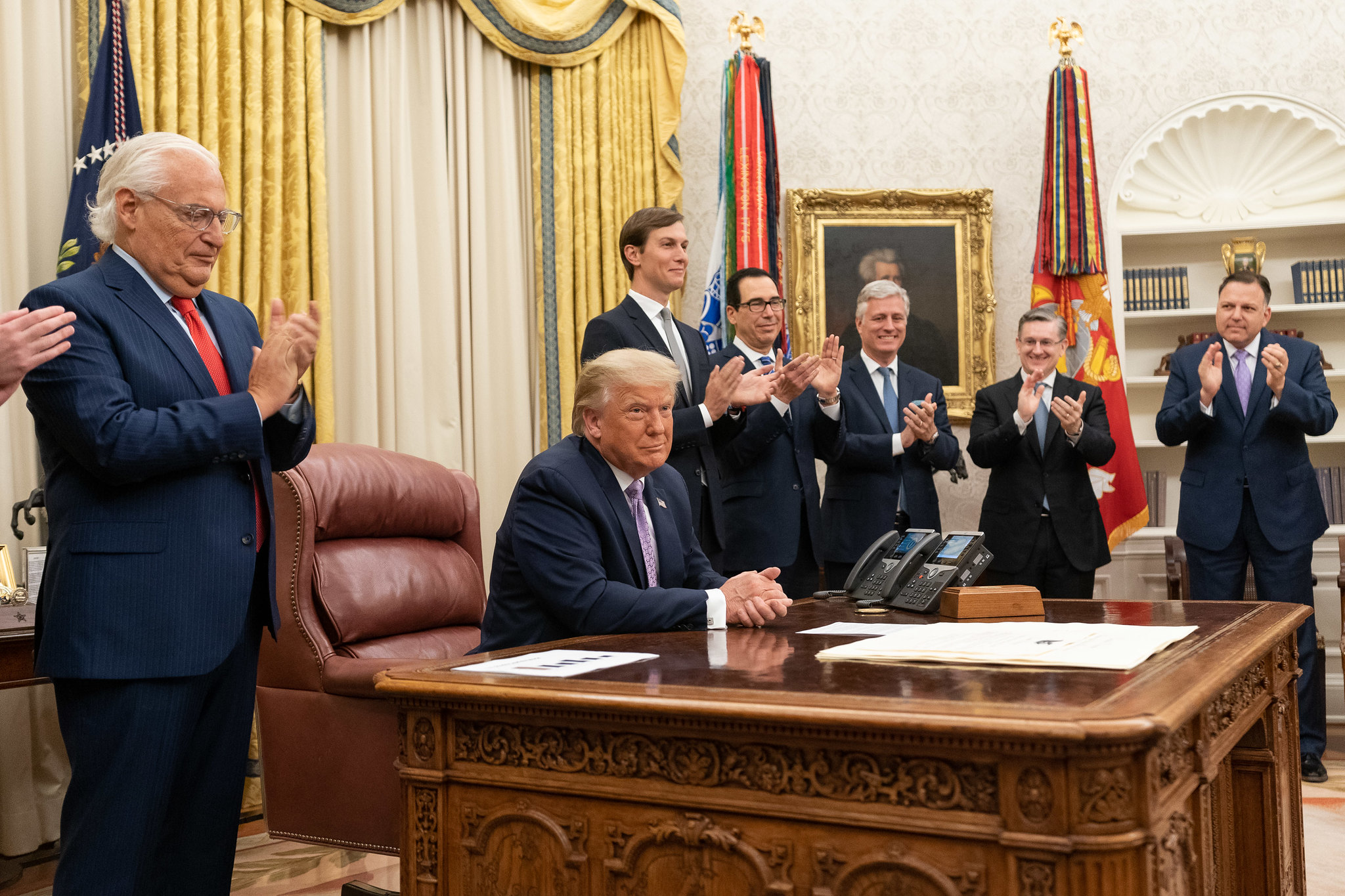
“Sometimes it’s just about curiosity,” explained Kareem Abdulaziz, a Lebanese consultant born and raised in the UAE who has been following Netanyahu’s Arabic account on Twitter for several years. “My whole life I’ve heard these shadowy explanations of what Israel has done to the Arabs, how Israel is the devil, why we should never talk to Israelis. The whole topic is so taboo that suddenly the opportunity to peak into the black box is impossible to resist.”
Another popular tool is the portrayal of Arabic culture in different Israeli contexts, seeking to foster familiarity and the appearance of sympathy and interest among Israelis toward Arabic music, language, and art. This also includes the manipulation of the Mizrahi narrative, erasing the establishment’s history of oppressing Jews who arrived to Israel from Middle Eastern and Muslim countries due to their Arabic identity and culture, while focusing exclusively on the fraternity and shared experiences of Mizrahi Jews and Arabs in the region.
“They think that I will be more sympathetic to Israel if I see that many Israelis are actually from an Arab background or from Islamic countries,” explained Mansour Benani, a student at Penn State originally from Rabat who follows several official Israeli Arabic accounts on Twitter. “But the truth is this can actually fuel antisemitic tendencies toward Jewish communities that have remained [in Arab and Muslim countries]. We have several such communities in Morocco who often try to disassociate themselves from Zionism.”
By demonstrating the Zionist sentiments of Jews who remained in these countries — which Benani claims is commonly believed among Moroccan residents to be the reason for their discrimination in Muslim countries following the 1967 war — these accounts further alienate Arab audiences. “They are saying, there is no difference between Judaism and Israel, and that even Jews from the Middle East have typically supported Israel. It justifies disdain for the Jews, which often originates from the rejection of Israel’s violent treatment of Palestinians.”
As Israel tightens its control over Palestinians in the occupied territories, and as Arab leaders’ strategic interests increasingly marginalize the occupation’s significance, some of these social media accounts have increasingly adopted overtly political messaging. This increasingly aggressive discourse attacks the Palestinians’ handling of the conflict, claims they have repeatedly rejected any peace initiative offered by Israel, portrays resistance as illegitimate terrorism, and exaggerates Palestinian ties with Iran and Qatar. This more recent addition to the accounts’ repertoire — specifically as it pertains to the portrayal of Iran as a malicious regional influencer — signifies shifting attention toward the Gulf.
As such, the government established the “Israel in the Khaleej” account in 2013. The Khaleeji social and cultural environment has been immensely impacted by social media’s facilitation of exposure to global communities, discourse, and trends, all of which led to the account’s rapid growth. Israel in the Khaleej is deemed by Israeli officials one of the MFA’s most successful social media outreach campaigns, and was branded a “virtual embassy” in 2018. “We can see more and more of our followers who credit our content with having changed their perceptions and attitudes towards Israel,” claims the account’s founder, Yonatan Gonen.
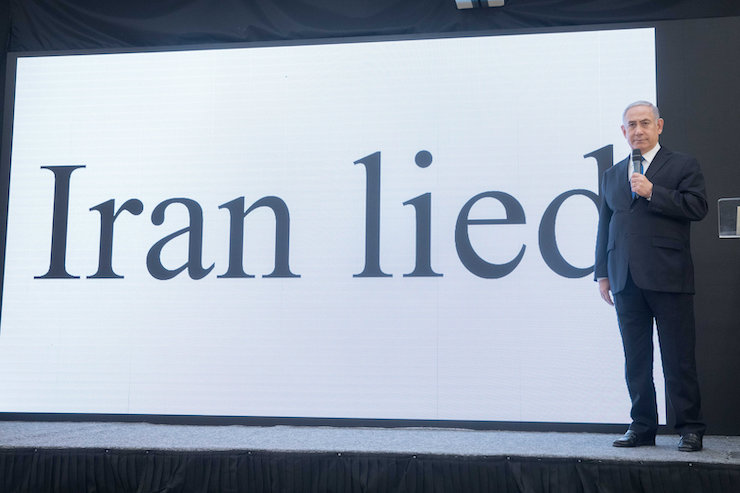
In recent years, there has been a notable increase in engagement on all of Israel’s official Arabic accounts’ with the Gulf. The Israeli government’s Twitter and YouTube channels have published videos of Gulf citizens speaking favorably about Israel, news of visits by GCC nationals, official Khaleeji statements regarding normalization of relations (which are often neglected in mainstream Gulf media), and messages from Israeli citizens to different Gulf states.
The political posts also often touch on shared strategic concerns or interests, specifically as they pertain to Khaleeji foreign policy, such as combating Iran’s nuclear advancements and curbing the spread of Islamic extremism (often equated with Palestinian resistance movements). They also highlight Netanyahu’s access to and cooperation with U.S. President Donald Trump’s administration, which is attractive to many Gulfies who favor Trump’s aggressive policies regarding Iran.
While the perceived Iranian threat was the catalyst and leading cause of Israel’s diplomatic ambitions in the Gulf, it is not the only uniting factor. In 2011, the Arab Spring brought Israel and the Gulf countries closer, as uprisings demonstrated the power of popular sentiments and their ability to topple authoritarian regimes.
The protests were equally threatening to Israel’s government — primarily interested in maintaining the status quo in which regional threats are neutralized — and to the Gulf regimes, which found the prospects of mass political movements to be both directly and indirectly threatening. The shared perceived threat of Islamist movements developing out of popular resistance is utilized by these official accounts to portray Palestinian national aspirations as dangerous, corrupt, and radical.
As such, posts often attack radical Islamic ideology, drawing a distinction between so-called “good Arabs” and “bad Arabs,” the former referring to compliant and productive citizens, while the latter to supporters of Islamist movements or “terror” organizations (including Palestinian militant groups).
In one Tweet, for example, Israel’s army spokesperson Adraee asks followers how they would want to be remembered: as “respected and successful” like Egyptian football star Mohammed Salah and Syrian sports journalist Mustafa Agha, or “as the cowardly terrorist Ahmad Jarrar,” who was accused of killing an Israeli settler and was shot dead by the Israeli army. These statements echo a common discourse heard in the UAE and Saudi Arabic, which expresses caution regarding radical Islamist trends.
Additionally, these accounts criticize Palestinian resistance, demonize efforts to fight against the occupation, and play into authoritarian regimes’ fear of popular movements that challenge the political status quo or support radical ideological currents. Using hashtags such as “Hamas is your Nakba” and “Not Awda (return) but Fawda (chaos),” official Israeli accounts portray uprisings and protests as violent and goaded by Hamas or supported by Iran.

In the late 2010s, prominent international Jewish organizations aligned with Netanyahu’s pro-occupation policies also jumped on the bandwagon. The American Jewish Committee’s Arabic Twitter account, created less than a year ago, now enjoys nearly 60,000 followers. Generally less political in their messaging than the Israeli accounts, the popularity of these organizations in many Arab countries demonstrates a growing interest in Judaism. It also highlights their role as a bridge for Arab nations interested in developing ties with Israel. The AJC, for example, has been a significant facilitator of relations between the UAE and Israel, using its alleged political neutrality as to connect UAE officials with Zionist communities that support the current Israeli administration in the West and in Israel.
Alongside official accounts, individual supporters of Israel’s pro-occupation policies who post in Arabic have also amassed significant following on Twitter. Edy Cohen, an academic specializing in the Arab world and former advisor to the Prime Minister’s Office, has a significant media presence with over 260,000 followers on Twitter. Cohen has become an extremely popular source of information about Israeli politics, and his persona has become a topic of criticism and debate among Arabic social media users region-wide.
Guy Maayan, a Likud member and journalist with the Israeli Public Broadcasting Corporation who regulalry posts in Arabic on his Twitter account, is especially vocal on Palestinian issues. He features Palestinians who reject the prospects of living under Palestinian sovereignty, while defending the Israeli government’s policies in the occupied territories. Mordechai Kedar, a right-wing academic and commentator, uses his account almost exclusively for engaging with the Palestinian issue, often claiming that popular support for Palestinian rights is an emotional trend that lacks logic and reason.
These independent accounts cooperate with official Israeli social media posts by retweeting and spreading explicitly political content. Many of them reach out to Khaleeji audiences, emphasizing issues that unite Israeli and Gulf political interests. There has also been an increase in posts about alleged animosity that Palestinians harbor toward the Khaleej, claiming that Palestinians have been irresponsible and ungrateful, manipulating the region (and especially the Gulf) through their claims of being victims of occupation. Such statements are often reposted enthusiastically by the Israeli accounts mentioned above.
Accordingly, there has been a steady increase of pro-Israel accounts in the GCC, particularly in Saudi Arabia, which simultaneously praise Israeli achievements and policies while condemning Palestinian efforts to resist the occupation. The arguments used by pro-Zionist Arabic social media accounts to justify their dwindling support for Palestine include Israel’s success in technological advancements and combatting terror, the corrupt and impotent nature of Palestinian resistance, and the Palestinians’ failure to accept previous peace agreements.
These classic hasbara arguments demonstrate the effectiveness of Israel’s outreach campaigns in the region and their success in adapting these tactics to the Arabic-speaking target audience. Such accounts, especially in the UAE and Saudi Arabia, use hashtags such as “Palestine is not my problem” or “yes to normalization,” and have run various campaigns over recent months that rally anti-Palestinian sentiments among Gulf citizens. This is done by showing Palestinians living in luxury or highlighting ordinary aspects of Palestinian life in an attempt to discredit claims of oppression and injustice.
Nadim Nashif, the executive director of 7amleh, The Arab Center for the Advancement of Social Media, explained that the rise of Israel’s Arabic social media presence seeks to show the high quality of life in Israel and the opportunities that await the Arab world once relations are completely normalized. “This phenomenon goes to show that relations with the Arab world are becoming stronger and that interest in the Palestinian cause is decreasing,” explained Nashif.
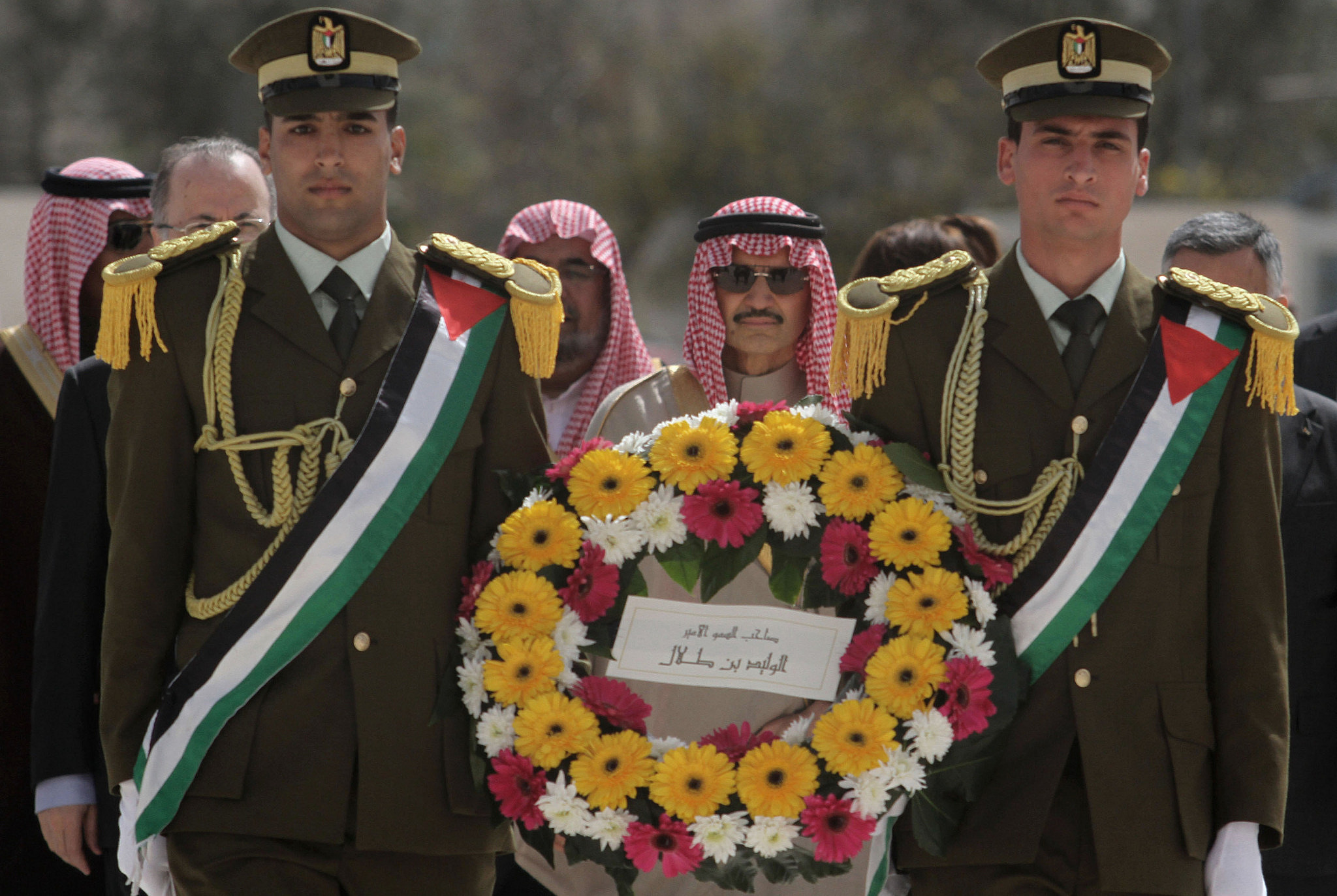
Indeed, this anti-Palestinian rhetoric is gradually taking hold in popular discourse outside of social media, with more Khaleejis posting uninhibitedly about their support for Israel as well as their wariness of the conflict with the Palestinians. Known popularly as “Arab Zionists,” they are gaining more legitimacy to speak freely about their pro-Israel views.
These voices are not exempt from internal criticism, and in some countries support for engaging with Israel still leads to ostracization (as is the case in Kuwait, for example). But in countries where official engagement with Israel is becoming increasingly visible, such as in the UAE, popular discourse is following suit.
“This is not only because of the fact that people here maintain a herd mentality, supporting what the government supports,” explained a social entrepreneur from Dubai who asked to remain anonymous given the critical nature of his statements regarding Emirati social norms, which could hurt his reputation among colleagues and peers. “It’s also because this has become an accepted way of speaking among Emiratis. Supporting Israel is no longer considered strange, it has become something you hear from time to time.” Indeed, as the interviewee suggested, the increased popularity of pro-Israel discourse can be traced to tendencies among citizens to adopt their government’s stances, as well as the official decision to remove education about the Palestinian issue from school curricula. Social media allows these sentiments to spread and become normalized.
Additionally, the Qatar embargo (enforced by the Saudi, UAE, Bahrain, Egyptian bloc in 2017 as a rejection of Qatari support for Islamic movements) has influenced the decline of pro-Palestine awareness and discourse, as Al-Jazeera (currently blocked in the UAE and Saudi Arabic) used to present the harsh reality of the Israeli occupation in a way that is no longer widely available to Khaleejis.
As such, few prominent Emirati intellectuals who vocally reject normalization with Israel are often subjected to criticism by other UAE nationals, facing resistance when advocating for a solution to the Palestinian issue before the establishment of diplomatic ties.
Expressing resistance to normalization is becoming increasingly dangerous in countries like the UAE, where the government may detain or even torture citizens who criticize authorities. Since the agreement was announced on Thursday, UAE authorities have made it clear that rejecting the government’s new policy on Israel will bring trouble to objectors. The Gulf nations have restrictions on residents’ ability to critique political entities and decisions, which has allowed pro-Israel discourse among Khaleejis to grow with little scrutiny.
As a result, Palestinian social media users are posting more frequently about Khaleeji relations with Israel, condemning their neighbors for abandoning the cause. “This normalization between Netanyahu and the Gulf has been attempted for years, and one of the methods used is incitement against Palestinians and fueling of tensions between Palestinians and Gulfies,” explained Sulaiman Khatib, a Palestinian social activist and co-founder of Combatants for Peace, an anti-occupation organization founded by ex- Israeli soldiers and former Palestinian armed fighters. “They definitely use Gulf voices to play up this conflict. However, I do trust the people of the Gulf that they will stand, as they have historically, with Palestine at the end of the day.”
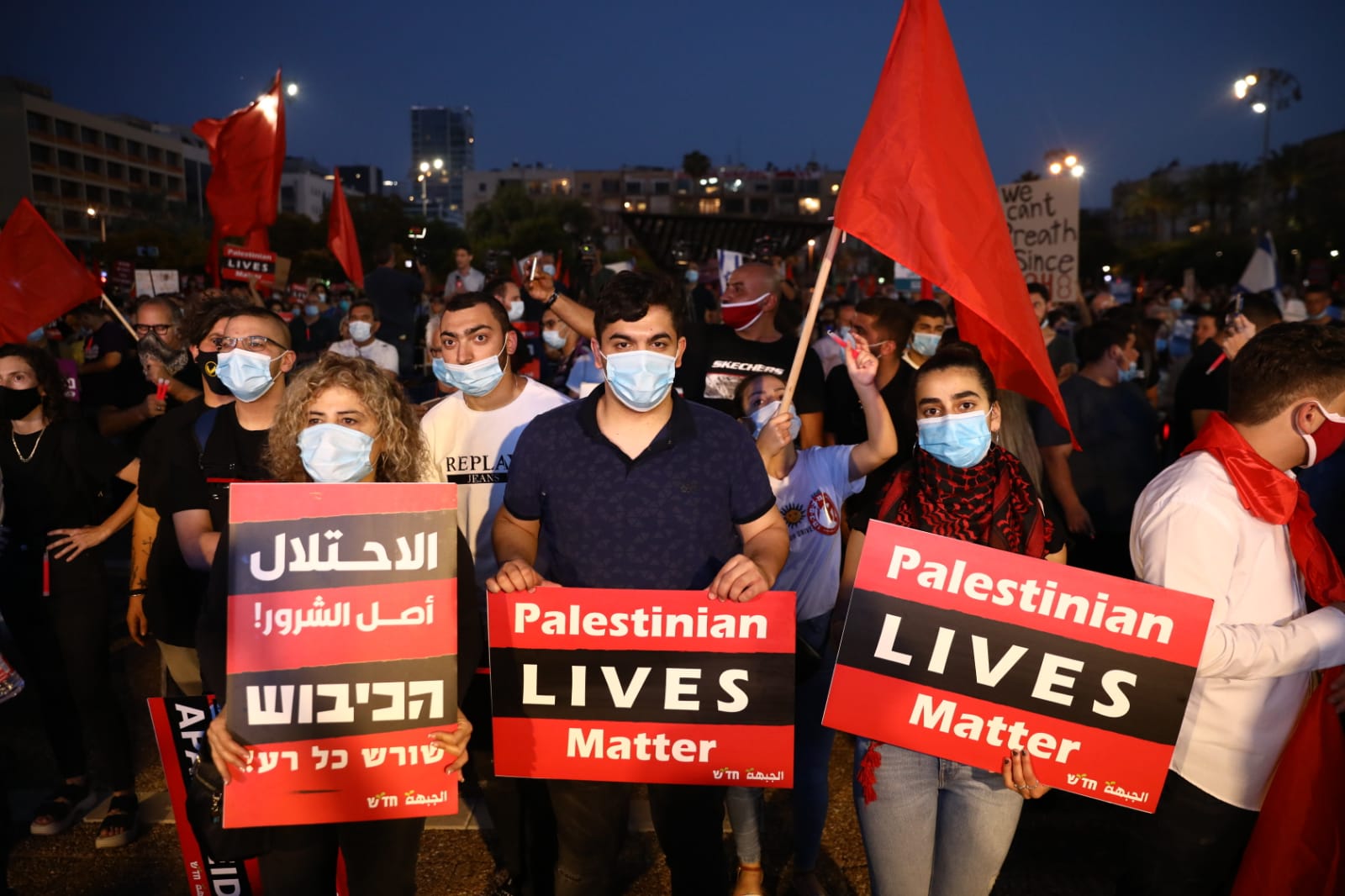
As the pro-occupation camp achieves success in fostering popular support for normalization with Israel, Israeli voices that reject the status quo and struggle to end the occupation have been slow to catch up in the struggle for influence over the Arab blogosphere, and have yet to establish a presence in Khaleeji discourse on both official and popular levels. Peace organizations and people-to-people initiatives in Israel have translated few of their materials to Arabic, let alone created an active presence in Arabic conventional media or social media.
“Khaleeji nationals have no idea that there are Israelis and Palestinians working together,” asserted Aisha al-Ghamdi, a Riyadh-based advocate for Saudi women’s rights. “People are convinced that showing interest in Israel inherently requires them to abandon the Palestinian cause, or to look down on Palestinians. This is the case on the web, it is very black and white.”
“The Israeli left has focused its outreach in the U.S. and Europe for several reasons,” explains Achiya Schatz, former director of communications at Breaking the Silence, an Israeli organization of veteran IDF soldiers working to expose the everyday reality of the occupation. “The Palestinians are doing advocacy work in the Arab world, they know the playing field much better than us, and can make their own strategic decisions about what is needed to influence public opinion there. Secondly, the lack of diplomatic ties has made such a task challenging and seemingly irrelevant. Thirdly, the authoritarian nature of the Gulf regimes create obvious challenges for us, a camp that focuses on the importance of human rights.”
It is true that public sentiment and policies in Europe and the U.S. have historically had the most significant influence on the conflict in terms of foreign intervention. However, the incentive of commercial and political cooperation with the GCC is becoming increasingly desirable for Israeli leadership. Netanyahu’s administration has been adamantly striving toward partnership with Khaleeji nations, and has now proven that the realization of these ties is not conditional on a peace agreement with the Palestinians. These nations’ diplomatic decisions have an increasingly significant effect on the conflict’s development, and will continue to play a role determining the nature of any future agreement with the Palestinians, as the normalization of ties becomes a reality.
Meanwhile, the anti-occupation camp is beginning to understand that in order to convince Khaleejis that ties with Israel should not come at the expense of Palestinian rights, it will have to start speaking directly to them. In June, three former Israeli diplomats published an article in The National, expressing their appreciation for Emirati Ambassador to the U.S., Youssef Al Otaiba, after he penned an article in Israel’s Yedioth Ahronoth, warning that annexation will “be a serious setback for relations with the Arab world.”
Similarly, a new Twitter account, “A New Voice from Israel,” recently published a short video featuring former members of Knesset speaking in Arabic and rejecting annexation and occupation. This video received widespread attention from young Khaleeji social media users, many of whom expressed surprise at the fact that some Israelis are more interested in realizing the establishment of a Palestinian state than Arab leaders. “It is unfortunate to find Arab voices denouncing normalization under the pretext of cooperation, while we see Israeli voices inside Israel who refuse to annex the West Bank and stand against Zionist racism and promote the establishment of an independent Palestinian state,” tweeted Talal Alkhanfar from Kuwait.
These initiatives are not only young, they are at a disadvantage because they lack the support of official institutions in Israel and the GCC. Yet they engage the silent majority of young Khaleejis who are interested in the potential benefits of relations with Israel and Israelis while remaining adamantly opposed to the violation of Palestinians’ basic human rights. If fostered and expanded, such efforts have the potential to engage many voices in the Gulf looking to move forward and create a truly interconnected region that offers opportunities to all of its residents.

